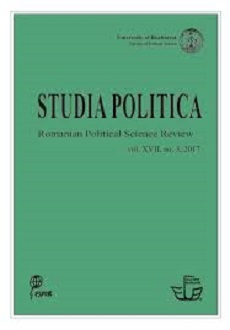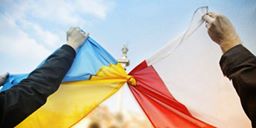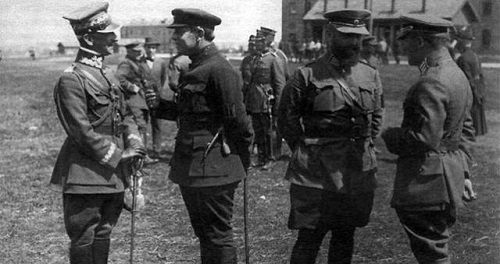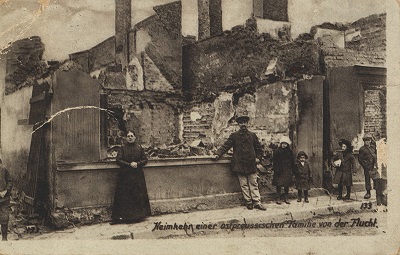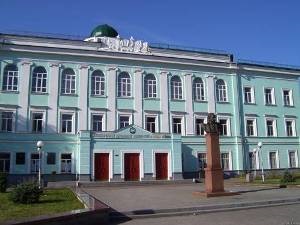Оголошення
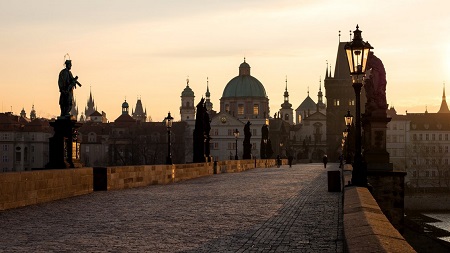
THE SECOND SEMINAR ON THE POST-COLD WAR MILITARY ZONES IN CENTRAL AND EASTERN EUROPE
Prague, Czech Republic, November 6-8, 2018
Organizing committee: Jan Pohunek (National Museum, Prague), Petr Janeček (Faculty of Arts, Charles University, Prague), Dagnosław Demski (Institute of Archaeology and Ethnology, Polish Academy of Sciences, Warsaw), Dominika Czarnecka (Institute of Archaeology and Ethnology, Polish Academy of Sciences, Warsaw), Elo-Hanna Seljamaa (Department of Estonian and Comparative Folklore, University of Tartu).
The post-Cold War military zones in Central and Eastern Europe represent an interesting environment for social sciences. The presence and withdraval of the Soviet Army in large areas of Central and Eastern Europe and also activities of the Allied forces after 1989, have impacted both landscape and human communities in many different ways. Their legacy is a subject to continuous renegotiations, reinterpretations and interventions on individual, local, regional and even transnational levels. The seminars on this topic (first of which took place in Borne Sulinowo in 2016) are an attempt to provide researchers an unique opportunity to compare original data from a number of states and to present analyses of dealing with the post-Cold War past and ‘foreign’ legacies.
We welcome applications from all disciplines and career stages and would like to invite scholars who conduct research on topics such as:
- the new status (administrative, political, economic, social, cultural) of the post-Cold War military zones;
- old and new functions of these zones;
- negotiating meanings of the past at transnational, national, regional, local levels;
- practices of remembering and forgetting;
- forging national/regional/local identities in new settlements;
- multidimensional processes of adapting and integrating these areas with the rest of the national territories;
- (re)constructing local, regional, national and transnational networks;
- ecological problems;
- commodification of the past.
Special focus of the 2018 seminar will be on change and interpretations of former military areas. Topics like different kinds of tourism, appearance of former military areas in media and oral tradition or shifts in aesthetic interpretations of such places are to be highlighted. Applicants might, however, also consider different subject matters, related but not limited to the proposed issues.
The seminar will be held in Prague on November 6-8, 2018. Please send the title of your paper, an abstract (100-200 words), your name(s) including institutional affiliation(s) to the organizer(s) no later than the end of June. The event will be hosted by the Department of Ethnography of the National Museum and the Faculty of Arts of the Charles University. First two days will be dedicated to presentations and discussion, then there will be a tour to the former military areas of Milovice or Ralsko on the third day. Both former bases have a longer tradition of military use dating back to pre-WWI period in the case of Milovice, and were occupied by the Soviet Army from 1968 to early 1990s.
We plan to publish papers as a special issue of the peer-reviewed journal. Previous issue from the first seminar was published by Folklore: An Electronic Journal of Folklore (http://www.folklore.ee/folklore/) and is available here: http://www.folklore.ee/folklore/vol70/.
Additional details concerning the seminar will be circulated in March 2016.
On behalf of organizers
Jan Pohunek jan_pohunek@nm.cz
Petr Janeček petr_janecek@ff.cuni.cz
Dominika Czarnecka d.czarnecka@hotmail.com
Dagnosław Demski d.demski2@gmail.com
Elo-Hanna Seljamaa elo-hanna.seljamaa@ut.ee
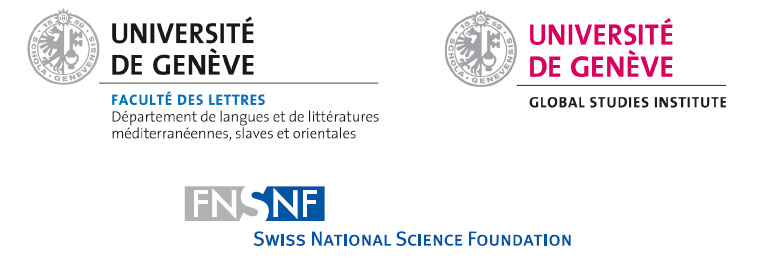
CALL FOR PAPERS
International Conference
Geneva, 13-14 December 2018
Divided Memories, Shared Memories
Poland, Russia, Ukraine: History Mirrored in Literature and Cinema
In Central and Eastern European countries, memorial questions appeared right after the demise of the communist regimes in 1989–1991, revealing long-denied processes. The phenomenon of the rise of repressed memories along with the rewriting of history, and the political uses of the past are noticeable in Poland, Russia, and Ukraine, three countries whose histories are as often shared as their memories are divided. The ‘memory wars’ in which these three states have sometimes been engaged since the end of the 1980s have been the subject of an abundant historiography. However, research has often focused on the analysis of memorial issues after 1989–91, while the paradigms of the communist era continue to be felt in these three countries. Above all, these works, no matter the field of study, be it political science, sociology, anthropology, or history – do not take enough advantage of the invaluable resources that are literature and cinema.
Literature and cinema are powerful means of promoting representations of the past and play a central role in shaping national identities. At the time of Communism, the political authorities were well aware of the power of literature. This is evidenced by the political scandal that broke out in 1968 after the publication of the novel A Cathedral by Oles Honchar, even though the writer’s way of describing Ukrainian national traditions was limited to the Soviet canon and literary standards of ‘socialist realism’. It is also evidenced by the silence on Vasily Grossman’s texts, Life and Fate, as well as Everything Flows, a novel written between 1955 and 1963, in which a man just released from the Gulag mentions the Great Famine in Ukraine, a taboo subject in the USSR until the late 1980s. In socialist Poland, the war crimes of the Ukrainian nationalist underground against the Polish population were never silenced, but the largest-scale massacre that occurred in the Volhynia region in 1943 (that would become part of the Soviet Ukraine after the war) was hidden. The state’s attempt to impose an official version of history through literature explains the importance of both Soviet samizdat and Polish drugi obieg.
In the same way as literature, cinema – ‘the most important of all’ according to the well-known Soviet slogan – played a fundamental role in promoting an official vision of history throughout the 20th century, as shown, for instance, in the Soviet movies of Igor Savchenko (The Horsemen, 1939, Bogdan Khmelnitsky, 1941), that accompanied Stalinist expansionism in Ukraine. Today, the great variety of Russian, Polish, and Ukrainian movies is not limited to state propaganda. Moreover, a number of themes crystallize the divergences from one country to another, for instance the Cossack theme (With Fire and Sword, Jerzy Hoffman, Poland, 1999; Bohdan-Zinoviy Khmelnytsky, Mykola Mashchenko, Ukraine, 2008; Taras Bulba, Vladimir Bortko, Russia, 2009). Finally, cinema is also used to reflect on national traumas (as, for example, in Katyń by Andrzej Wajda, Poland, 2007, or in Haytarma by Akhtem Seitablayev, 2013, the first Crimean Tatar movie about the Soviet deportation of 1944).
Representations of events and historical figures that have had a resonance in Russia, Poland, and Ukraine in the literature and cinema of the 20th and 21st centuries, will be the subject of the multidisciplinary and international conference that will be held at the University of Geneva in December 2018.
- Objects of analysis. We will focus on the representations of historical events and figures that have been the subject of conflicting historical narratives in at least two of the three countries in the 20th century literary productions (novels, short stories, historical biographies for the general public, etc.) and cinematographic works (not only auteur movies, but also mass production for propaganda or commercial purpose) of Poland, Ukraine, and Russia.
- Our attention will not be only focused on conflicts. Indeed, a particular attention will be paid to literature and cinema as possible fields of historical dialog, and of Polish, Ukrainian, and Russian reconciliation. We will try to assess if convergent interpretations (generally less obvious to identify than ‘memory wars’) have emerged in the literature and cinema of these three countries around some historical events or figures. We will also try to see whether – before the collapse of the communist regimes, or afterwards, throughout a century marked by abrupt political changes and periods of (relative) political and diplomatic stabilizations – literature and cinema have only contributed to the writing of ‘closed’ national narratives or if they have also taken part in the development of a shared memory.
We are open to submissions of proposals from scholars of history, culture, politics, literary studies, and other related disciplines. Interdisciplinary and comparative papers are also welcome. We are waiting for proposals on books and writers, movies and moviemakers that will not focus only on literature and cinematographic criticism, or on the historical context itself, but that will also investigate the conditions in which literary and cinematographic productions dealing with representations of the common past in Poland, Russia, and Ukraine were created.
Proposals should include the title of the presentation, an abstract (around 300 words), a brief resume (one page), and contact details (e-mail address, postal address, phone number). Proposals should be sent to GenevaDecember2018Conference@yahoo.com by April 30, 2018.
Should a proposal be accepted, accommodation and travel costs will be covered.
Organizer: University of Geneva (Global Studies Institute and Faculty of Arts, Russian Department). The Conference is organized in the frame of the Project: Divided memories, shared memories. Ukraine / Russia / Poland (20th-21st centuries): an entangled history, supported by the Swiss National Science Foundation.
Organizing committee: Korine Amacher (Geneva), Eric Aunoble (Geneva), Andrii Portnov (Berlin / Frankfurt/Oder)
Keynote speakers: Rory Finnin (Cambridge University), Susanne K. Frank (Humboldt University Berlin)
Date: December 13-14, 2018
Conference language: English
Publication: 2019


